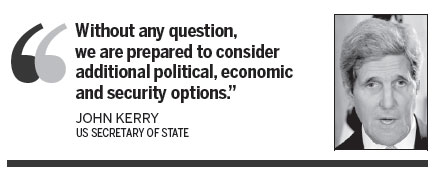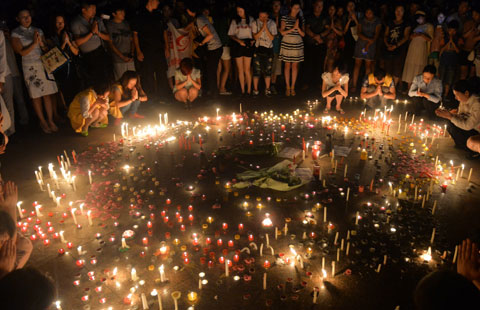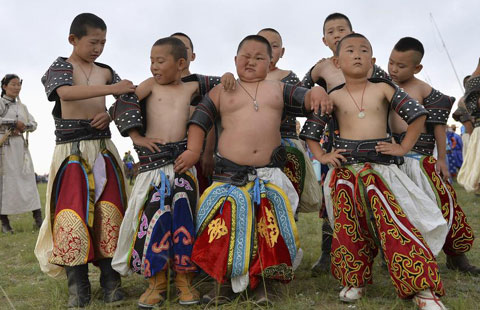Iraqi prime minister resists change in government
Updated: 2014-08-13 07:42
By Associated Press in Baghdad (China Daily)
|
|||||||||||
Iraqi incumbent Prime Minister Nouri al-Maliki appeared more isolated on Tuesday as he pressed his battle to remain in power while Iraqi politicians and the international community rallied behind a Shiite prime minister-designate who could be a more-unifying figure, badly needed if the nation is to confront a spreading Sunni insurgency.
US Secretary of State John Kerry urged the prime minister-designate, Haider al-Ibadi, on Tuesday to work quickly to form an inclusive government and said the US is prepared to offer it significant additional aid in the fight against Islamic State militants.
The power struggle in Baghdad comes as Iraq is battling militants from the al-Qaida breakaway group in the north and the west. The onslaught by the Islamic State, which has captured large chunks of Iraqi territory since June, has become the country's worst crisis since the US troop withdrawal in 2011.
On Monday, al-Ibadi, the deputy speaker of parliament from al-Maliki's Shiite Dawa party, was selected by President Fouad Massoum to be the new prime minister and was given 30 days to present a new government to lawmakers for approval.
US President Barack Obama called al-Ibadi's nomination a "promising step forward" and urged "all Iraqi political leaders to work peacefully through the political process."
But al-Maliki, who has been in power for eight years, defiantly rejected the nomination, insisting it "runs against the constitutional procedures" and accusing the United States of siding with political forces "who have violated the Constitution."
In Sydney, Kerry said on Tuesday that the United States "stands ready to fully support a new and inclusive Iraqi government.
"Without any question, we are prepared to consider additional political, economic and security options," Kerry said.
The US has already increased its role in fighting back against the Sunni extremists who have threatened the autonomous Kurdish region in northern Iraq. US airstrikes have helped the Kurds achieve one of their first victories over the weekend after weeks of retreating. And senior US officials said Monday that US intelligence agencies are directly arming Kurds who are battling the militants.
The development reflected a shift in Washington's policy of working only through the central government in Baghdad.
Al-Ibadi's nomination was a major breakthrough in the political deadlock that followed the April parliamentary elections. It shows that al-Maliki - who has demanded that he retain his post as prime minister for a third term since his bloc won most seats in the assembly - has lost some support with the main coalition of Shiite parties.
His critics say al-Maliki contributed to Iraq's political crisis by monopolizing power and pursuing a sectarian agenda that alienated the country's Sunni and Kurdish minorities.
Al-Ibadi, the former minister of communications from 2003-04, pledged to form a government to "protect the Iraqi people." He was nominated after receiving the majority of votes from lawmakers within the Iraqi National Alliance, a coalition of Shiite parties.
So far, there have been only rare voices in support of al-Ibadi among Iraqi Sunnis, who have long criticized al-Maliki of sidelining their community and inflaming sectarian tensions.
"Change is essential, and a chance must be given to others because defiance is wrong," Hamid al-Mutlaq, a Sunni lawmaker, told The Associated Press.
The Shiite alliance that proposed al-Ibadi "has to come up with a clear approach over how to run the government in a way that corrects the mistakes, changes the course, and boosts national unity away from sectarianism and crises," al-Mutlag added.
But there were also those who defended al-Maliki's struggle to retain his job and who criticized al-Ibadi's nomination.
"This decision will lead the country into big problems, and the president bears full responsibility for this situation," said Mohammed al-Ogeili, a lawmaker from al-Maliki's State of Law parliamentary bloc.
The US airstrikes, which began last week, have reinvigorated Iraqi Kurdish forces battling the Islamic State. On Sunday, the Kurdish peshmerga fighters retook two towns from the Sunni militants in what was one of their first victories after weeks of retreat.
But in the eastern Diyala province, Kurdish forces were driven out on Monday from the town of Jalula after fierce fighting with the militants.

(China Daily 08/13/2014 page11)
Today's Top News
UK launches 24-hour visa service in China
Chinese medics reach Sierra Leone
Anti-trust move is market-based
China Railway Corp pulls plug on Voith's gearboxes
Thailand waives visa fees for Chinese tourists
Sino-Japanese ties at a '40-year low'
Yingluck returns to Thailand
Turkish PM wins direct presidential election
Hot Topics
Lunar probe , China growth forecasts, Emission rules get tougher, China seen through 'colored lens', International board,
Editor's Picks

|

|

|

|

|

|





